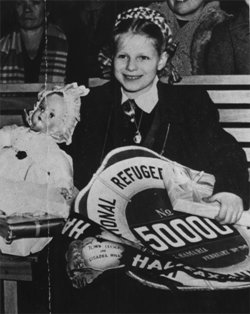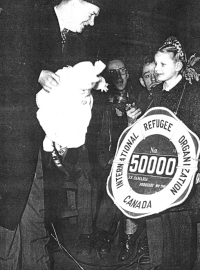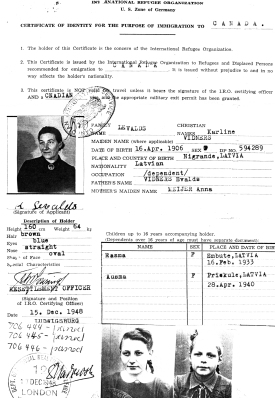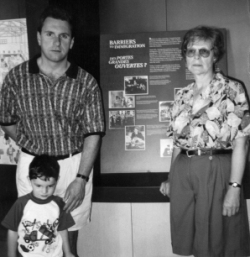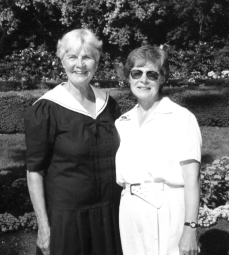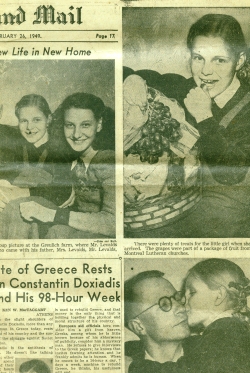Sobey Wall of Honour
Column
14
Row
18
Ausma Levalds was Canada's 50,000th displaced person welcomed into Canada after the Second World War, brought by the international Refugee Organization. She came through Pier 21 in February 1949. Ausma was 8 years old when she came with her mother Karline Levalds and her sister Rasma. Following her father, Janis Levalds who emigrated a year before to Canada.
Here is a story about Karline Levalds, told by her daughter Ausma:
On April 16, 1906 Karline was born into a busy three generation family in Nigrande, Latvia, daughter of Anna (Meiers) and Juris Vidners, a sister to Lize (1902), a deceased brother (1903) and Paulite (1904). Anna, born in 1907 died from diptheria at the age of six. In 1909, three year old Karline was sent to reside, for a year, with her maternal grandparents, at Gruntos. In 1910, she was reunited with her family for the next five years at Mezainos. Karline again was separated from her parents and sisters: Lize, Paulite and Velta, born in November of 1915, for three years during the war. She was taken to Gruntos while the rest of the family was ordered from their farm to Vidzeme. In 1918, Karline lived only briefly with her family, prior to her mother's death from brain inflammation, and then, her maternal grandparent's farm Grunti became her permanent home.
Karline's life with her aging grandparents was solitary. She was obliged to read the Old Testament to her grandfather on Sundays. As soon as he dozed off, Karline read the New Testament however, this pleasure was brief as, Grandfather's cane and berating voice quickly forced her to resume reading the Old Testament. Karline enjoyed shepherding the farm animals, this duty provided her with the opportunity to befriend the animals, and her environment. She completed elementary school in Vainode while living with her grandparents.
The country students lived in a large attic room at the village school and attended classes from Monday to Saturday noon. Parents or guardians sent whatever food they could, at the beginning of the week to the school with their child. Pupils in the early 1900 were exposed to German, Russian and Latvian depending upon which country occupied Latvia at a particular period of time. Karline, a physically small child and coming from such a poor and backward farm, encountered derision at the hands of the village students. Never the less, she cherished the privilege of attending school and was a diligent pupil. She welcomed the escape and the new worlds that reading provided. She reveled in Latvian Folklore and Folksongs Dinas. They nurtured her being, instilled her with a reverence for nature, a respect for one's labours, and a national pride that sustained her throughout her life as did her faith.
Shortly after Karline's Mothers death, her father remarried. In 1925 her sister Valija was born and her maternal grandfather, Otis Meiers died. Karline postponed making marriage vows to Janis Levalds when her father died in March of 1927. At last, on June 22, 1929 Karline Vidners and Janis Levalds were married. Both, Karline and Janis put all their resources into buying out her sisters' share of Gruntus. Her grandmother Lavize Meires (Turner) continued to live at Gruntos until her death in 1936.
Life at Gruntos was challenging both physically and financially: the land had to be improved, livestock purchased, new outbuildings erected, as well as a new home. Karline did not experience a division of labour, she worked everywhere: the barn, the fields, established a garden and an orchard, collected mushrooms and blueberries from the adjoining state forest plus, the usual household duties of cleaning, cooking, bread baking, churning butter, making cheese and weaving linens and blankets. She planted shrubs, flowers, and tulips, although discouraged from planting the tulips by the Agricultural Consultant, who favored perennials, as they required less maintenance. Always eager to learn the latest techniques and methods she attended courses on Applied Household Sciences offered by the state. And now, instead of the Old Testament she read the newspaper to the hired help who insisted that she sit and rest upon its delivery. She managed all this as well as bearing and raising three children: Ilmars (Nov 8, 1929), Rasma (feb 16,1933) and Ausma (April 28, 1940).
War again disrupted Karline's life! Karline and family had no other recourse but to abandon their farm and depart from their Motherland late in December 1944, to spend the next four years as D.P. in Germany. In February 1949, Karline and daughters followed her husband and son, who had emigrated the previous year, to Canada. Without any English Karline, lived and worked for a short while as a cook and a cleaning woman in a hotel in New Hamburg, with her daughters.
In late spring, she started to work at Hahn Brass, packaging hardware. She rented two rooms on the second floor of a young couple's townhouse for the three of them. The rooms did not have water, toilet or a cooking stove. One had to pass through the young couple's living quarters to ascend the stairs to the two rooms. The stairs had to be traveled a number of times a day since the hand water pump and the outhouses were in the back yard! During this period Karline's husband and son were completing their respective farm labour agreements.
In 1950 with the families pooled earnings and a borrowed $500, a lot was purchased and everyone helped with the building of the house. At last, Karline once again owned a bit of property and a home! Eagerly she planted and tended the fruit and vegetable gardens as well as the tress, shrubs and flowers. Although Karline missed and never forgot the song birds and native plants of Latvia, she did rejoice in hearing the robins sing, in seeing a Hummingbird hover about her flowers and, the bright splash of color of the Cardinal and the Blue Jay. She marveled at the beauty of the Trillium and Columbine! Karline took English and History at night classes in preparation for becoming a Canadian citizen.
In June 1974 Karline and her husband moved to Peterborough where, jointly with Ausma, they bought a home, so that she could provide loving care for her grandson, Andrew. Quickly again she established a flower and a vegetable garden.
Karline's Faith was a great comfort to her throughout her years as was her love and respect for nature, poetry and Dinas. Her life centered on her home, family, and friends; sharing her love and skills freely with all!
